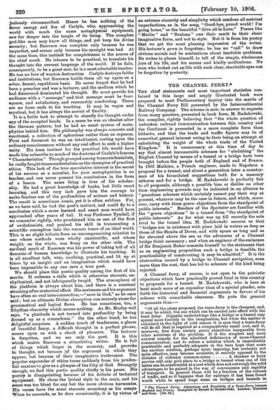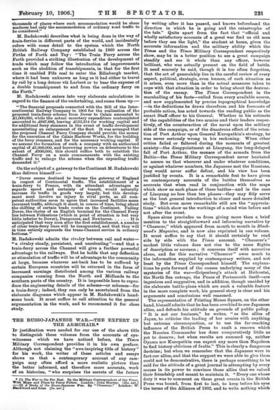THE CHANNEL FERRY.*
THE chief statements and most important statistics con- tained in this large and amply illustrated book were prepared to meet Parliamentary inquiry into the merits of
the Channel Ferry Bill presented by the Intercontinental Railway Company. The scheme is now, in answer to requests from many quarters, presented in book form, M. Radakowski, the compiler, rightly believing that "the whole question of unbroken railroad communication between this country and the Continent is presented in a more complete form than hitherto, and that the trade and traffic figures may be of somewhat general interest owing to their being an attempt at calculating the weight of the whole trade of the United Kingdom." It is unnecessary at this time of day to say that almost innumerable schemes for " abolishing " the
English Channel by means of a tunnel or a bridge have been brought before the people both of England and of France. In 1802 Mathieu, a French engineer, made to Napoleon a proposal for a tunnel, and about a generation later a country- man of his formulated suggestions both for a masonry isthmus and for a bridge. M. Radakowski is perfectly fair
to all proposals, although a possible bias or dislike on other than engineering grounds may be indicated in an allusion to "grandiose schemes which certainly cannot pay their way at
present, whatever may be the case in future, and which, more- over, carry with them grave objections from the standpoint of public interests." Readers of the Spectator are familiar with the " grave objections " to a tunnel from "the standpoint of public interests." As for what was up till recently the sole
rival to the tunnel idea, M. Radakowski assures us that " bridges are in existence with piers laid in waters as deep as those of the Straits of Dover, and with spans as long and as far elevated above the sea as the advocates of a Channel bridge think necessary ; and when an engineer of the eminence of Sir Benjamin Baker commits himself to the statement that as an engineering proposition such a bridge is feasible, the practicability of constructing it may be admitted." It is the obstruction caused by a bridge to Channel navigation, even more than the cost, that has led to schemes of the kind being rejected.
A Channel ferry, of course, is not open to the patriotic objections which have practically proved fatal in this country to proposals for a tunnel. M. Radakowski, who is here at least much more of an expositor than of a special pleader, sets forth the historical and financial arguments in favour of his scheme with remarkable clearness. He puts the general arguments thus :—
"Of all the plans proposed, the train-ferry is the cheapest, and, it may be added, the one which can be carried into effect with the least delay. Gigantic undertakings like a bridge or a tunnel may appeal more forcibly to the imagination, but when the matter is examined in the light of cold reason it is seen that a train-ferry will do all that is required at a comparatively small cost, and is, moreover, free from certain grave objections inseparable from other solutions of the problem. It is the simplest and most natural remedy for the admitted deficiencies of cross-Channel communication ; and to refuse a solution which is immediately practicable and perfectly adequate in the bare hope that some day another solution, perhaps more imposing, but certainly not more effective, may become available, is entirely opposed to the dictates of ordinary common-sense A steamer or ferry service will only give place to a bridge or tunnel when one of the latter can be constructed at a cost which does not outweigh the solid advantages to be gained in the way of convenience and rapidity of transport. In general these will be a fraction of the volume of traffic, and so it happens that for railways it has been found worth while to spend huge sums on bridges and tunnels in • Tha Channel Ferry Advantages and Feasibility of a Train-Ferry between England and France. Compiled by Ernest de Badakowski. London: Harrison and Sons. [10s. 6d.]
-thousands of places where such accommodation would be sheer madness had only the accommodation of ordinary road traffic to be considered."
M. Radakowski describes what is being done in the way of train-ferries in different parts of the world, and incidentally refers with some detail to the system which the North British Railway Company established in 1860 across the Firths of Forth and Tay : " The Train Ferry across the Forth provided a striking illustration of the development of trade which may follow the introduction of improvements such as the abolition of transhipments, in that for the first time it enabled Fife coal to enter the Edinburgh market, where it had been unknown as long as it had either to travel ty rail by a long detour via Larbert or to bear the expense of a double transhipment to and from the ordinary ferry on the Forth."
M. Radakowski enters into very elaborate calculations in regard to the finance of the undertaking, and sums them up :-
" The financial proposals connected with the Bill of the Inter- continental Railway Company in 1905 for the realisation of the proposed train-ferry scheme from Dover to Calais amounted to £1,000,000, while the actual monetary expenditure contemplated amounted to £847,686, leaving £152,314 for working capital and for additional ferry steamers in the event of traffic development necessitating an enlargement of the fleet. It was arranged that the proposed Channel Ferry Company should provide the money for the execution of the Calais Harbour Works, for the building of the ferry steamers, and for the necessary working capital. If we assume the formation of such a company with an authorised capital of £1,000,000, and borrowing powers on debentures to the extent of £300,000, this should suffice both to establish the Channel Ferry on a scale commensurate with the existing traffic and to enlarge the scheme when the expanding traffic demanded it."
On the subject of a gateway to the Continent M. Radakowski thus delivers himself :-
"Dover seems destined to become the gateway of England in respect of Continental traffic. The establishment of a train-ferry to France, with its attendant advantages as regards speed and certainty of transit, would naturally increase its traffic in goods very largely, but this develop- ment need involve no injury to rival ports, as all com- petent authorities seem to agree that increased facilities mean increased traffic, although it must, in course of time, bring about the shifting of certain trade routes on the Continent. Failing Dover, the choice of an English terminal for the Channel Ferry lies between Folkestone (which in point of situation is but very
little inferior to Dover), Dungeness, and Newhaven It is anticipated that very soon after the first establishment, a number of other train-ferry lines will be inaugurated, and that they will in time entirely supersede the trans-Channel service in ordinary bottoms. "
M. Radakowski admits the rivalry between rail and water- " a rivalry steady, persistent, and unrelenting "—and that a train-ferry across the Channel will give a further powerful advantage to the railways. But he holds that any deflection or stimulation of traffic will be of advantage to the community
at large, because whatever set-back has to be suffered by certain European countries will be returned in the form of increased earnings distributed among the various railway companies running from the North and Midlands to the southern parts of the country. It is impossible here to repro- duce the engineering details of the scheme—or schemes—for a train-ferry ; indeed, they can only be ascertained from the elaborate diagrams which appear in M. Radakowski's hand- some book. It must suffice to call attention to the general
argumentation in the work, and to recommend it for close study.











































 Previous page
Previous page